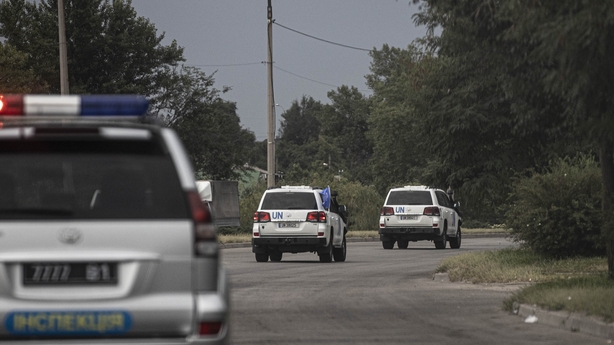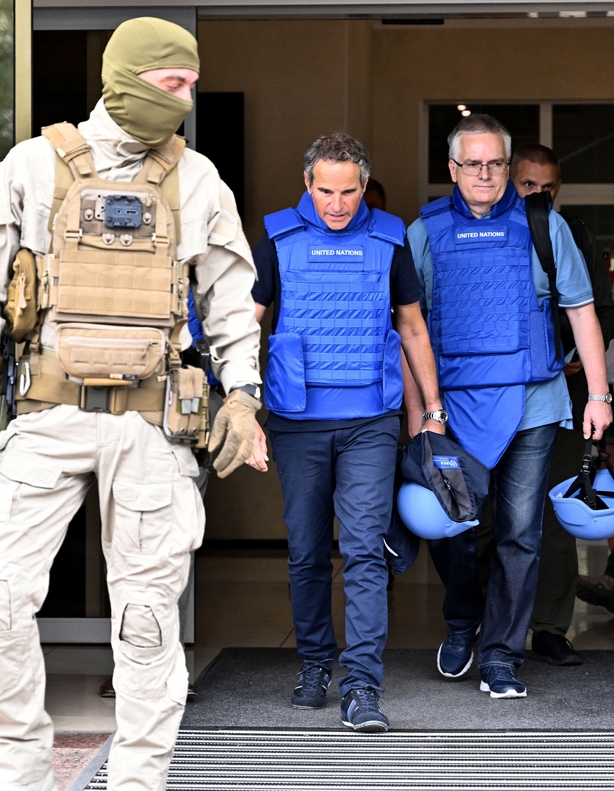The "physical integrity" of the Zaporizhzhia nuclear plant in southern Ukraine has been "violated", the head of the International Atomic Energy Agency (IAEA) said after a visit there today.
IAEA chief Rafael Grossi led a team of inspectors to the Russian-controlled plant that has been frequently shelled in recent weeks raising fears of a nuclear incident.
"It is obvious that the plant and physical integrity of the plant has been violated several times," Mr Grossi told reporters after he returned with part of his team to the Ukrainian-controlled area.
"I worried, I worry and I will continue to be worried about the plant," he said, adding, however, that the situation was "more predictable" now.
"We have spent there four or five hours. I have seen a lot, and I have my people there, we were able to tour the whole site," Mr Grossi said about the long-anticipated inspection.
He said that part of his 14-strong mission to the plant will stay at the facility "until Sunday or Monday, continuing with the assessment".
"We are going to continue presence there, some of my experts. We have a lot of work there, to do analysis of some technical aspects," Mr Grossi said.
He did not specify how many people will be staying at the facility, adding that "we could draw up a number of questions and initial observations, initial assessments, and they are going to dig deeper into that so that we could have a report".
He continued: "This morning the situation was pretty difficult.
"There were moments where fire was obvious, heavy machine gun, artillery, mortars two or three times, we were very concerned," Grossi said, describing the security situation during his visit.
But he noted that the mission received "splendid support from the UN security team".
I am finishing my first visit to #Ukraine's #Zaporizhzhya Nuclear Power Plant.@IAEAorg is here to stay and will maintain a continued presence at #ZNPP. pic.twitter.com/k4zO3IMe2I
— Rafael MarianoGrossi (@rafaelmgrossi) September 1, 2022
"I think we showed that international community is there, could be there and we will be continuing this," Mr Grossi said.
The Zaporizhzhia nuclear plant - Europe's largest nuclear facility - has faced repeated shelling in recent weeks, with Kyiv and Moscow blaming each other for the attacks, raising concerns of a possible incident.
Ukraine was the scene of the world's worst nuclear disaster in 1986, when a reactor at the northern Chernobyl plant exploded and spewed radiation into the atmosphere.
More shelling
Early-morning shelling in the area had forced the closure of one of Zaporizhzhia's six reactors.
Energoatom, Ukraine's nuclear agency, said it was "the second time in ten days" that Russian shelling had forced the closure of a reactor.
It said the plant's emergency protection system kicked in shortly before 5am (3am Irish time), shutting reactor five, "due to another (Russian) mortar shelling" and that a backup power supply "was damaged" in the attack.

After Russian forces seized the plant on 4 March, Energoatom shut two reactors, followed by a third after shelling on 5 August.
With a fourth in repairs, today's incident leaves only one of the six reactors working.
International Committee for the Red Cross (ICRC) chief Robert Mardini said it was "encouraging" the IAEA team was going to inspect the plant because the stakes were "immense".
"When hazardous sites become battlegrounds, the consequences for millions of people and the environment can be catastrophic and last many years," he added.

Meanwhile, Ukrainian troops pressed ahead with a counter-offensive in the nearby region of Kherson to retake areas seized by Russia at the start of the invasion.
In its morning update, the presidency said "heavy explosions continued for the last 24 hours" across Kherson, while five people were killed and 12 others wounded in the eastern Donetsk region.
Despite the conflict, now in its seventh month, today marked the start of a new school year for children across Ukraine.
Figures from Ukraine's education ministry show 2,199 educational institutions have been damaged in the fighting, with 225 completely destroyed.
Just over half of the 23,000 institutions surveyed by the ministry are equipped with bomb shelters, meaning they can physically reopen, while those without will only offer online learning.
But in Kharkiv, Ukraine's second city, all learning will be online due to constant Russian shelling, the mayor said last month, with a British charity saying today that dozens of its schools had been "targeted".
An investigation by the Centre for Information Resilience found 41 institutions had been "partially or completely destroyed" with researchers finding the shelling "was targeted, rather than a by-product of indiscriminate attacks on civilian infrastructure".
Meanwhile, the Kremlin denounced as "ridiculous" the decision by EU foreign ministers to suspend a 2007 visa facilitation deal with Russia over the Ukraine conflict.
Ministers agreed the measure yesterday, but stopped short of closing its borders to all Russians, as demanded by Ukraine.
